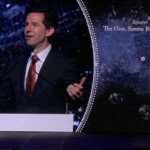CRC budget roundup

The Government will provide $25 million of new funding over the forward estimates to the CRC Program for research and development on artificial intelligence and machine learning.
The CRC Association understands that this funding will be made available through the CRC-Project sub-program, in the same way that additional CRC-Ps for advanced manufacturing were made available last year. Some budget commentary has described the new money as “a new CRC in artificial intelligence” but we understand this is wrong; it will be new CRC-Ps.
Unfortunately, $20 million has been removed from the CRC Program to “assist with Budget repair”. CRCA is advised that none of this money comes from the coming Round 20 and the funding round and future CRC-P funding rounds will proceed as planned.
$15 million of CRC Program funds will be provided as a contribution to Antarctic research over the forward estimates. CRCA understands the CRC Program will continue to manage these funds, with the Department of Environment and Energy.
The Antarctic Climate and Ecosystems CRC completes its term on 30 June this year and the funding will enable the continued coordination of research activities that was such an important role of the ACE CRC.
The impact of the 2014 cut to the CRC Program comes off in this Budget, effectively moving the Program to a slightly higher baseline. The overall impact is that the Government commitment to the CRC Program moves from $709 million over the forward estimates to $731 million.
There are therefore mixed signals from the Government in the 2018 Budget regarding the CRC Program, and I hope they turn out to be positive.
It is great that money has been devoted to continuing work in the Antarctic. I’m particularly glad to see that the CRC Program will continue to have a management role in the allocation and management of this funding.
We know that coordination and synthesis of research is just as important as the research itself in creating an impact. I hope we see the core competencies and skills of the ACE CRC team continue to play that vital role as this research moves into a new phase.
Having said that, the allocation of money from the CRC Program to Antarctic research is clearly not in keeping with the recommendations of the Miles Review and the new rules for the Program that we understood we were working with.
The CRC Association and indeed the Chairman of the CRC Advisory Committee, have pointed to the problem for CRCs of national interest under the current rules. ACE CRC is not the only one affected; the Lowitja Institute – incorporating the CRC for Aboriginal and Torres Strait Islander Health – and the Bushfire and Natural Hazards CRC and the Autism CRC immediately come to mind as other CRCs clearly serving the national interest that will complete their CRC terms soon.
If the decision to use CRC Program funds to support Antarctic research is a reversal of the Miles Review recommendations, then it should apply to everyone. Otherwise, we will find individual lobbying efforts to support particular causes will intensify.
The competitive nature of the CRC Program developed over a quarter of a century where the Advisory Committee looks at all applications and recommends the best to the Minister could be weakened if slabs of money are allocated outside the process.
The Coalition policy was to remove Labor’s “priority public good” process, but of course the vital need for this research doesn’t go away. CRCA felt the priority public good process was imperfect, but if we are returning to a de facto priority public good process, then maybe it’s time to face up to the issue itself?
You can’t simply replace the work of these important CRCs with a series of projects in another portfolio and expect to get equivalent outcomes.
The managers of ACE CRC, Lowitja, Autism or Bushfire and Natural Hazards, and I could name many others, play far more than an administrative role. They represent the communities most affected by R&D – from inception and conduct of the research to its coordination and implementation. That’s why CRCs are successful. The people most affected are in charge.
This is a hard issue. The CRC Association absolutely understands the desire of governments to fund new areas and to focus on commercially oriented work.
Our suggestion has been to keep the program open and competitive, recognising government priorities and using the experience and smarts of the CRC Advisory Committee to determine the best outcomes.
The 2018 budget is a good practical outcome, but it does indicate the post-Miles rules need some tweaking.
Dr Tony Peacock has been the Chief Executive Officer of the CRC Association since 2010. An agricultural scientist turned innovation advocate, he is an Adjunct Professor of Applied Ecology at the University of Canberra and sits on several administrative boards.








